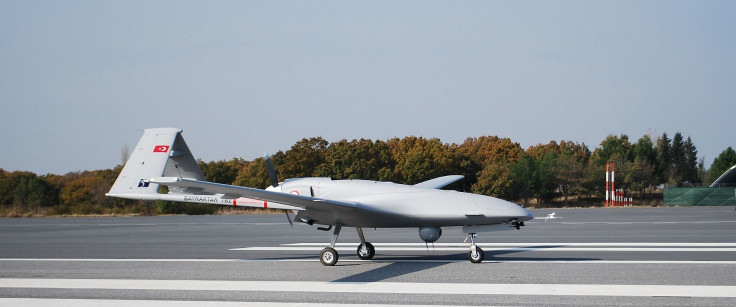Canada Agrees To Sell Military Drone Equipment To Turkey Despite Arms Embargo

KEY POINTS
- Canada banned arms sales to Turkey last October after its military incursions into northern Syria
- Canada removed a similar arms embargo against Saudi Arabia
- Turkey is the third largest buyer of Canadian military goods
The Canadian government has approved the sale of sophisticated military drone optics to Turkey despite an ongoing arms embargo against Ankara arising from its military incursions into northern Syria last October.
Turkey’s principal drone suppliers, Bayraktar Tactical UAS and TAI Anka, use electro-optical and infrared cameras manufactured by L3Harris Wescam of Canada in their armed and unarmed drones.
Canada asserted that while restrictions on arms exports to Turkey are still in place, Ottawa nonetheless said it will consider some exemptions.
Turkey and Canada are both allies in the North Atlantic Treaty Organization.
In April 2020, Canada had extended its arms embargo on Turkey “until further notice” but did not explain why even as the U.S. and other allies of Turkey lifted similar bans. In addition, Canada removed a similar embargo against Saudi Arabia, which is engaged in a deadly civil war in Yemen.
“They [Canadian government] didn't explain why they took this step,” a Turkish official said. “It might be about domestic politics as the Armenian and Greek lobbies in the country [Canada] have some political power.”
Turkish officials were concerned about the Canadian arms ban since Ankara regularly deploys drones in its conflicts in Syria and Libya. Reportedly, the Turkish military has lost drones in those battlefields and need to replace them.
At that time, Turkish President Recep Tayyip Erdogan, Defense Minister Hulusi Akar and Foreign Minister Mevlut Cavusoglu called senior Canadian officials to seek to resolve the impasse.
Erdogan also spoke by phone to Canada’s Prime Minister Justin Trudeau.
“Trudeau didn’t provide any reasoning for his decision to extend the ban in the call,” a Turkish official said. “He said they would take some steps to alleviate Turkish concerns regarding the exports; that they would review everything case by case.”
Middle East Eye reported that after these high-level discussions, Canada agreed to exempt military-level cameras from the arms ban.
Canada’s Department of Foreign Affairs said Canada could issue export permits for military items subject to circumstances.
“In April 2020, Canada significantly narrowed the scope of its policy regarding the export of controlled items to Turkey,” said a spokesperson for the government’s Global Affairs Canada department. “While restrictions will continue to apply to military exports to Turkey, Canada will consider on a case-by-case basis whether there are exceptional circumstances, including but not limited to NATO cooperation programs that might justify issuing an export permit for military items.”
Nonetheless, Turkish officials remain worried about the continuing ban on other types of military equipment and training.
For example, last year, Turkey bought two Canadian Bombardier Global 600-type business aircraft. “The aircraft are in Turkey but Canadians will not provide the required training and transfer of know-how because of these bans,” said a Turkish official. “One Canadian firm has also stopped supplying a helicopter platform needed for [Turkey’s] national warship program.”
Turkey is the third largest buyer of Canadian military goods, with Saudi Arabia the top customer. Relations between Turkey and Canada have generally been good in recent years.
Canada has also apparently banned the export of military goods to Azerbaijan. Since 2017 when private Canadian companies sold some armored vehicles to Azerbaijan, no permits to sell arms to that country have been approved.
The Armenian National Committee Of Canada, or ANCC, commended Canada for stopping arms sales to both Turkey and Azerbaijan.
“Turkey and Azerbaijan pose a significant military threat within their immediate region and beyond,” wrote ANCC Co-Presidents, Hrag Tarakdjian and Shahen Mirakian. “While Turkey continues to destabilize the Middle East and threaten the very existence of local minorities, Azerbaijan has significantly increased its military preparedness, constantly signaling a renewal of hostilities in the Republic of Artsakh [the Nagorno-Karabakh Republic], while threatening to attack the Republic of Armenia directly.”
The ANCC chiefs added: “Canada simply cannot become complicit in the unspeakable war crimes and human rights abuses sanctioned and carried out by regressive dictatorships such as Turkey and Azerbaijan.”
© Copyright IBTimes 2025. All rights reserved.





















